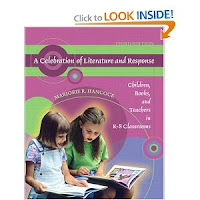 "We can no longer think of reading comprehension as a series of discrete skills that can be summed to achieve comprehension ability. Instead, we see comprehension as a complex process involving interactions between readers and texts in various contexts for various purposes." (“Developing Expertise in Reading Comprehension,” Technical Report #512, 1990, p. 6)
"We can no longer think of reading comprehension as a series of discrete skills that can be summed to achieve comprehension ability. Instead, we see comprehension as a complex process involving interactions between readers and texts in various contexts for various purposes." (“Developing Expertise in Reading Comprehension,” Technical Report #512, 1990, p. 6)"Reading and writing. Talking and learning. It's ALL about comprehension." — Sharon Taberski
Why Blog
I’m passionate about finding ways to simplify comprehension instruction and learning. I’m concerned that we are defining comprehension too narrowly as an accumulation of five or six meta-cognitive strategies when cultivating comprehension involves so much more than that. We need to help children acquire accurate fluent reading skills and strategies; build background knowledge; develop their oral language and vocabulary; make reading-writing connections, and acquire a repertoire of meta-cognitive strategies to use as and if needed.
So I invite you to join me in blogging about this ever-so-important topic. I look forward to hearing your ideas, teaching strategies, book recommendations, classroom stories, etc., basically anything that will inspire a healthy conversation among colleagues.
Wednesday, January 26, 2011
Reader Response: Authentic Interaction or Code for Test Prep?
 "We can no longer think of reading comprehension as a series of discrete skills that can be summed to achieve comprehension ability. Instead, we see comprehension as a complex process involving interactions between readers and texts in various contexts for various purposes." (“Developing Expertise in Reading Comprehension,” Technical Report #512, 1990, p. 6)
"We can no longer think of reading comprehension as a series of discrete skills that can be summed to achieve comprehension ability. Instead, we see comprehension as a complex process involving interactions between readers and texts in various contexts for various purposes." (“Developing Expertise in Reading Comprehension,” Technical Report #512, 1990, p. 6)
No comments:
Post a Comment